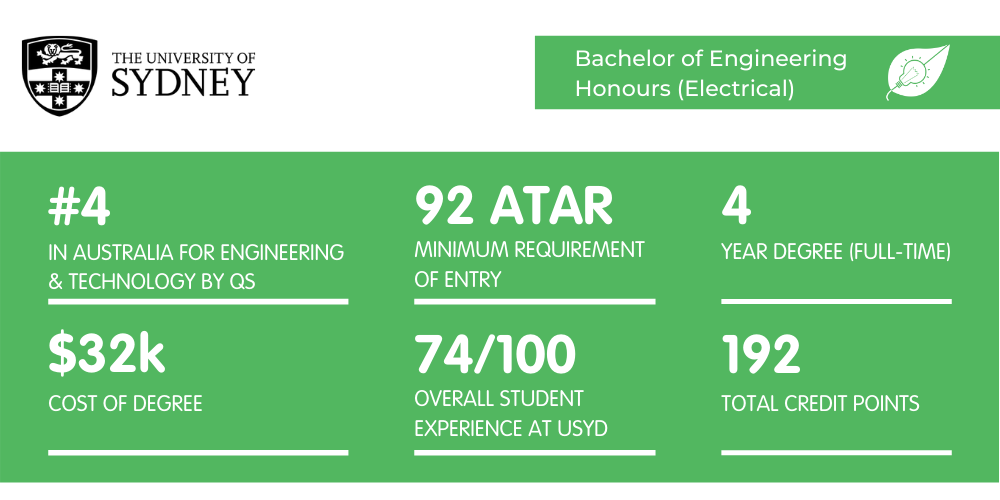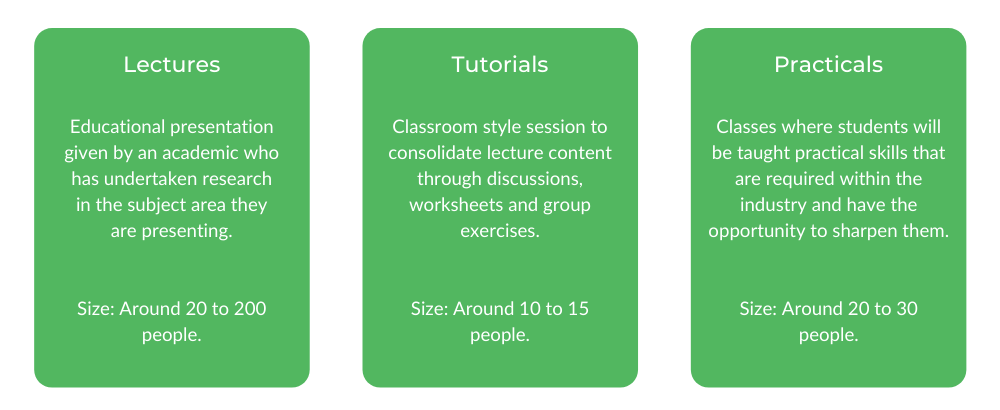Has the world of electronics always fascinated you? Have you ever enjoyed tinkering with different parts of a machine? Then, studying Electrical Engineering at USyd is something you should consider!
In this article, we’ll be giving all the information and insider-insight you’ll need to know before applying for this degree.
Let’s dive in!
What is a Bachelor of Engineering Honours (Electrical Engineering) at USYD?
Core Units and Specialisations
How to Get into Electrical Engineering at USYD
What’s the Teaching Format?
What’s the Faculty and Culture Like?
What is a Bachelor of Engineering Honours (Electrical Engineering) at USYD?
Electrical Engineering at USyd deals with the use of electricity in different systems of all sizes, from circuits to cars. In this course, students learn the scientific foundations of what electrical devices need and are taught how to solve problems in different electronic systems!
If you’ve always been curious about electricity, as well as how to design and create systems that require it, this could be an awesome degree for you!
Honours
In the last year of study, Electrical Engineering at USyd integrates an Honours program, where students complete two theses while also completing their remaining specialisation electives.
Double Degree Options
This course doesn’t need to be studied with another degree. However, students can choose to study Electrical Engineering with the following degrees:
Career Paths
The main career and most obvious pathway for this degree is becoming an Electrical Engineer. However, based on a graduate’s specialisation, they can diversify into careers including:
-
- Power transmission and generating systems engineer
- Industry power supply engineer
- Computer hardware designer
- Consultant
- Project Manager
Core Units and Specialisations
There are two types of core units: Engineering Core and Electrical Core!
Engineering core units teach all the basics that are needed for any engineering discipline which include single and multivariable calculus, Linear Algebra, Statistics.
The Electrical Core units teach the foundational knowledge necessary to understand the later specialisation units as well as to understand the basics of Electrical Engineering (physics, electronics, programming and so on). These units include:
-
- Data Structures & Algorithms
- Fundamentals of Electrical and Electronic Engineering
- Introduction to Computer Systems
- Simulation and Numerical Solutions in Engineering
- Electronic Devices and Circuits
- Signals and Systems
- Digital Logic
- Linear Mathematics and Vector Calculus
- Physics 1 (Regular)
- Physics 1 (Technology)
- Physics 2EE
The multiple physics units help students understand the principles behind the physical objects electrical engineers make. They are studied in the first and second year of the degree.
Similarly, the Electronic Units, Fundamentals of Electrical and Electronic Engineering and Electronic Devices and Circuits, introduces students to circuit analysis as well as key electrical devices (BJTs and Mosfets). Data Structures & Algorithms introduces students to use programming to solve problems efficiently.
Specialisations
There are five specialisations to choose from in Electrical Engineering at USyd:
A Computer Engineering specialisation focuses the student’s knowledge of Electrical Engineering into areas of advanced computer systems, computer science and computer networking. The specialisation is mainly taught in computer-based tutorials and also diversifies the student’s skillset into Software Engineering.
An Intelligent Information Engineering specialisation teaches students the latest technologies such as smart cities, advanced manufacturing, automatic driving and 5G. There is a focus on multimedia and sensory signal processing in this specialisation.
Work Experience
In the final year of the course, there is an integrated engineering work experience where students must complete a minimum of 200 hours working at a firm of their choice. This is part of the Professional Engagement Program.
How to Get into Electrical Engineering at USYD
The ATAR cut-off for Electrical Engineering at USyd is 92, and there are no additional assessments for entry.
Assumed Knowledge
The assumed knowledge for the course is HSC Mathematics Extension 1 and Physics. While it isn’t compulsory to have studied these subjects, USyd recommends taking a bridging course to gain the foundational knowledge for this degree.
Alternate Pathways
There are other entry pathways other than meeting the ATAR cut-off. Current USyd students can opt to transfer to Electrical Engineering from a similar degree, such as a Bachelor of Science.
Scholarships
Prospective students should definitely look into scholarships as well!
For female applicants, the School of Electrical and Information Engineering Diversity Scholarships offer a lump sum of $15000. The requisite is that they have achieved a minimum ATAR of 95 or above.
More generally, the Sydney Scholars Award offers $6000 to outstanding Year 12 students who have earned an ATAR from 95 to 99.85.
What’s the Teaching Format?
Electrical Engineering at USyd is studied in semesters and in a combination of lectures, tutorials and practicals.
Class Structure
Lectures
Lectures are generally attended by upwards of 20 students and are usually 1-2 hours long. They provide the general content and understanding of the unit whereby the lecture speakers mainly explain the basics; however, it’s more than likely that students will use various resources to learn, not just the lectures.
Tutorials
Tutorials have upwards of 10 to 15 students attending them. These classes are where students apply their problem-solving skills towards physics questions, math questions and concepts at a theoretical level.
Tutes push students to think outside the box and analyse literature to solve new and challenging problems. They are also usually 1-2 hours long.
Practicals
Practicals are generally mandatory classes with around 20 to 30 people attending — though, this depends on how many people do the unit. As the name suggests, they are hands-on classes where students get to work with different types of electrical systems.
They are generally held in the laboratory or computer rooms. Practicals are longer classes that often last 3 hours.
Contact Hours
Since studying Electrical Engineering requires practical work, expect to spend 15 hours or more per week attending the classes!
Assessments
The main assessments are in the form of weekly assessments, mid-semester assessments and final exams.
Each week, students will complete quizzes and lab reports from their practicals. These ensure that students comprehend the class content and so, these assessments are very low in weighting. Weekly quizzes are around 1%, and lab reports are approximately 2-5%.
During the semester, students usually are assessed on a lab exam that weighs 15-20%. This also reinforces the students’ knowledge and ability to conduct their work accurately and within a prompt timeframe.
Lastly, the final exams are sit-in exams around 60% and focus on the students’ problem-solving and calculation skills. With such a large weighting, they consolidate all of the unit content, and there are often questions that will challenge and extrapolate from the general content.
Skills That You Refine and Learn
The top 3 skills that Electrical Engineering at USyd refines are:
-
- Analytical
- Laboratory
- Problem-solving
Analytical skills are sharpened by applying the foundational knowledge of physics, calculus, scientific methodology and other mathematical concepts to understand electrical systems and other architecture in a student’s chosen specialisation. For example, an Intelligent Information Engineering specialisation will provide analytical skills in multimedia and sensory signal processing.
As practicals are part of the weekly classes, Electrical Engineering graduates will acquire proficient laboratory skills and the technical knowledge on how to use tools and different methods in the laboratory safely.
Lastly, Electrical Engineering graduates will develop an eye for problem-solving and applying efficient strategies to troubleshooting problems. These will include routine methods as well as innovative ideas in the context of electrical engineering systems!
What’s the Faculty and Culture Like?
Faculty and Cohort
For Hussam, he has found that the faculty is generally very supportive and helpful. They continuously encourage reaching out if clarification on anything is needed and if extra help is required.
Though the facilities are currently being renovated, the faculty still ensures that each class has all the essentials needed for effective learning.
Engineering students have been some of the nicest people Hussam has ever met, and all new students will always be welcomed with open arms. They are very supportive, and whenever you need help, they’ll always work with you.
SparkSoc
SparkSoc is the main Electrical Engineering Society and is a definite recommendation for new first-year Electrical Engineering students. The society holds networking nights specifically for aspiring Electrical Engineers that allow students to interact with industry representatives.
SparkSoc also has various workshops on Electrical Engineering skills, for example, low-level programming. This gives students a chance to diversify their skillset and learn something fun and new.
There are various social events, such as games nights that allow members to meet their peers. SparkSoc are also renowned for their free food events!
Interested in the pros and cons of Electrical Engineering at USYD? Check out our piece here!
Lynn Chen is a Content Writer at Art of Smart Education and is a Communication student at UTS with a major in Creative Writing. Lynn’s articles have been published in Vertigo, The Comma, and Shut Up and Go. In her spare time, she also writes poetry.






